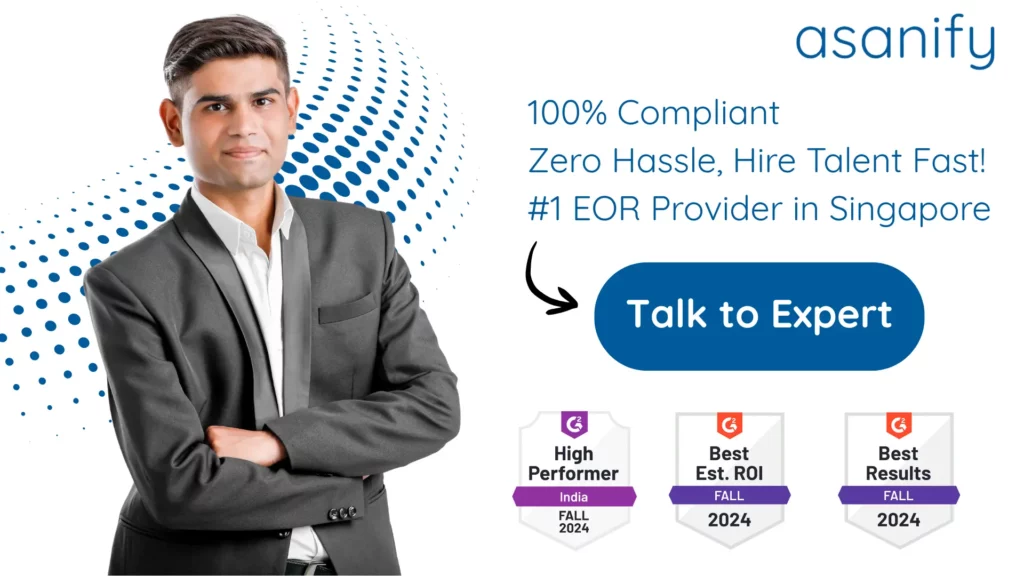Singapore continues to gain traction as one of the most advanced and trusted outsourcing destinations in Asia by 2025. Known for its legal transparency, highly skilled workforce, and English proficiency, Singapore offers a uniquely compliant and innovation-friendly ecosystem for outsourcing services such as finance, IT, legal, HR, and customer support. For businesses in the Asia-Pacific region and beyond, Singapore provides a blend of efficiency, infrastructure, and cultural alignment.
Unlike offshore hubs focused solely on cost reduction, Singapore prioritizes data integrity, intellectual property (IP) protection, and service precision. Whether you’re engaging Employer of Record (EOR) providers for compliant cross-border employment or outsourcing payroll, development, and compliance, this guide gives you a full roadmap—from industry insights to cost savings, legal frameworks, and best practices for success in 2025.
Table of Contents
- What is Outsourcing and Why Do Companies Do It?
- Overview of the Outsourcing Industry in Singapore
- Why is Singapore a Hotspot for Outsourcing in 2025?
- What Types of Work Can You Outsource to Singapore?
- Three Commonly Outsourced Services in Singapore
- Step-by-Step Guide to Outsourcing to Singapore
- Best Practices to Make Outsourcing to Singapore a Success
- Pros and Cons of Outsourcing to Singapore
- Legal and Compliance Framework in Singapore
- Cost Breakdown – How Much Can You Save?
- Outsourcing Projects from the USA, UK, and APAC to Singapore
- Conclusion
- FAQs
What is Outsourcing and Why Do Companies Do It?
Outsourcing is the business practice of delegating specific operational tasks or business functions to external vendors who specialize in those areas. These tasks can range from IT development and HR services to legal consulting and customer service. Companies outsource to increase cost-efficiency, accelerate operations, and gain access to high-quality, specialized talent without expanding in-house teams.
Singapore has become a strategic outsourcing choice not only due to its tech infrastructure and multilingual workforce but also because of its legal predictability and governance. For example, global firms may outsource payroll processing or data protection advisory services to Singapore-based firms that are familiar with APAC compliance regulations. Others may tap into niche skills in fintech, AI, or legal consulting.
Outsourcing models include BPO (Business Process Outsourcing), KPO (Knowledge Process Outsourcing), and increasingly, collaborations through EOR and SaaS-backed vendors—offering flexibility for both short-term projects and long-term scalability.
Overview of the Outsourcing Industry in Singapore
Singapore’s outsourcing sector continues to thrive in 2025, particularly in finance, legal tech, IT, HR, and customer service. As a regional headquarters for many Fortune 500 companies, Singapore already has a well-established infrastructure to support high-value services. The country’s focus on digitalization, government-backed smart nation initiatives, and startup-friendly policies further bolster its position as a premier outsourcing hub.
Outsourcing providers are concentrated in business districts such as Raffles Place, One-North, and Jurong, offering everything from legal documentation and tax compliance to AI solutions and multilingual call centers. With the rise of hybrid work models and digital-first services, Singaporean vendors have adapted quickly, integrating cloud platforms, security protocols, and data residency frameworks that are aligned with global expectations like GDPR and PDPA (Personal Data Protection Act).
The government’s supportive role via organizations like the Economic Development Board (EDB) and Infocomm Media Development Authority (IMDA) ensures companies have access to digital grants, skilled professionals, and a robust legal ecosystem—making outsourcing in Singapore both future-proof and fully compliant.
Why is Singapore a Hotspot for Outsourcing in 2025?
Cost-Effective for High-Value Services
While Singapore is not the cheapest destination in Asia, it offers strong cost efficiency for high-value outsourcing functions. Businesses in the US, UK, Australia, and Hong Kong choose Singapore to avoid the risks and inefficiencies associated with low-cost vendors. Singapore’s transparent pricing, reliable project execution, and reduced legal risks deliver better ROI over time.
Vendors often offer packaged services—such as payroll processing, compliance monitoring, and HR onboarding—that reduce the need for multiple external consultants. For businesses seeking premium services without setting up local entities, Singapore’s EOR providers offer structured pricing and full regulatory assurance.
Globally Competitive Talent Pool
Singapore boasts one of the most highly educated workforces in Asia. With prestigious institutions like NUS, NTU, and SMU producing tech, legal, and finance talent, the city-state maintains a strong pipeline of skilled professionals fluent in English and Mandarin.
The government’s continuous investment in upskilling and digital fluency—through initiatives like SkillsFuture—ensures that local talent remains globally competitive. Whether it’s software engineering, data science, legal auditing, or multilingual support, Singaporean professionals are trained to meet international standards with a customer-first mindset.
Multilingual Capability and Global Business Culture
As a global business hub, Singapore has English as its primary business language, with wide fluency in Mandarin, Malay, and Tamil. This linguistic flexibility enables smooth collaboration with regional clients across APAC and international clients from the US or Europe.
Singaporeans are known for their punctuality, professional communication, and cross-cultural adaptability—factors that reduce friction in client-vendor relationships. Many outsourcing vendors in Singapore have extensive experience working with multinational companies, which ensures project alignment, timely delivery, and cultural sensitivity.
Strong IP, Data, and Compliance Protection
Singapore ranks among the top countries globally for intellectual property protection and data governance. With the PDPA closely mirroring GDPR, companies outsourcing services involving sensitive customer or financial data can confidently engage Singapore-based vendors without fearing compliance breaches.
Vendors frequently hold certifications such as ISO 27001, SOC 2, and adhere to PDPA guidelines. The local legal system is transparent and arbitration-friendly, with English-language contracts and enforceable IP protections—making Singapore an ideal jurisdiction for outsourcing in regulated industries like finance, legal, and healthcare.

What Types of Work Can You Outsource to Singapore?
Singapore offers a robust outsourcing ecosystem across both technical and non-technical functions. It specializes in services that demand precision, multilingual capabilities, and strict regulatory compliance. From finance and HR to IT support and software development, Singapore-based outsourcing ensures high-quality and globally aligned delivery. These include both technical and non-technical domains:
- Software and app development (mobile, SaaS, enterprise solutions)
- Legal services (contract drafting, IP law, regulatory compliance)
- Financial services (payroll processing, accounting, tax reporting)
- Multilingual customer support (email, chat, voice)
- HR services (employee onboarding, recruitment process outsourcing)
- Cybersecurity consulting and IT helpdesk
- Data analytics, reporting, and business intelligence
- Content marketing, digital strategy, and SEO
- Healthcare documentation and med-tech consulting
From startups needing backend support to MNCs outsourcing finance and compliance roles, Singapore provides tailored solutions through highly capable service providers that understand both global and regional business requirements.
Suggested Read: Labour Laws in Singapore: A Complete 2025 Guide for Employers and Employees
Three Commonly Outsourced Services in Singapore
1. Finance & Payroll Services
Singapore is a global financial hub and excels in offering outsourced payroll, accounting, tax compliance, and reporting services. Providers manage CPF contributions, statutory filings, and cross-border payroll processing under strict confidentiality. This is especially attractive for companies using Employer of Record (EOR) models to onboard employees compliantly without setting up local entities.
2. Legal and Regulatory Compliance
With Singapore’s reputation for legal transparency and IP enforcement, legal process outsourcing (LPO) is a growing sector. Firms specialize in contract review, GDPR/PDPA advisory, and multilingual legal documentation. Legal professionals are highly qualified and familiar with both common law systems and regional regulatory frameworks.
3. IT and Cloud Services
Singapore offers advanced IT services from cloud migration to enterprise software development. Many outsourcing vendors are certified partners of AWS, Azure, and Google Cloud. Agile development teams operate with mature DevOps practices, supporting industries like fintech, healthtech, logistics, and SaaS.
Step-by-Step Guide to Outsourcing to Singapore
Step 1: Map Your Needs
Assess internal gaps and decide if you need IT, legal, payroll, or customer service support. Define the scope, tools, and security protocols required.
Step 2: Research Trusted Vendors
Shortlist vendors via Enterprise Singapore, LinkedIn, or platforms like Clutch. Check for sector-specific expertise, compliance record, and bilingual capabilities.
Step 3: Request Proposals
Send a structured RFP outlining KPIs, timelines, tech stack, and compliance needs (e.g., PDPA). Evaluate vendors on agility, experience, and cost efficiency.
Step 4: Conduct Due Diligence
Verify business registration with ACRA, financial health, client testimonials, and security certifications like ISO 27001. Request references.
Step 5: Review Contracts
Ensure SLAs, IP clauses, termination terms, and confidentiality agreements are legally binding. Contracts should comply with both local and international standards.
Step 6: Onboard and Integrate
Provide SOPs, access to collaboration tools (Slack, Jira, HubSpot), and brand guidelines. Assign internal liaisons for seamless execution.
Step 7: Monitor and Optimize
Set up weekly syncs, monthly performance reviews, and quarterly audits. Use scorecards and dashboards to track outcomes and plan expansions.

Best Practices to Make Outsourcing to Singapore a Success
- Document all deliverables and KPIs up front
- Use PDPA-compliant vendors for data-intensive projects
- Engage an EOR when hiring talent without local entity setup
- Set communication expectations across time zones early
- Train teams on brand, tone, and global compliance priorities
- Choose vendors who offer flexible scaling and modular pricing
- Continuously review vendor performance and upgrade as needed
Pros and Cons of Outsourcing to Singapore
| Pros | Cons |
| World-class legal and IP protection | Higher rates than regional low-cost hubs |
| Fluent English and multilingual workforce | May not be ideal for high-volume transactional work |
| Transparent, stable regulatory environment | Small local talent pool in some niche tech stacks |
| High service quality with enterprise-grade vendors | Strict compliance expectations add onboarding steps |
| Time-zone alignment for APAC and early EMEA coverage | Fewer freelance platforms compared to global hubs |
Legal and Compliance Framework in Singapore
Singapore’s regulatory ecosystem is built for trust, compliance, and digital growth. The Personal Data Protection Act (PDPA) governs how personal data is collected, stored, and used, making Singapore one of Asia’s most GDPR-aligned jurisdictions. Outsourcing contracts often include:
- Data security clauses aligned with PDPA and/or GDPR
- IP ownership and jurisdiction terms enforceable under Singaporean law
- SLAs and NDAs with arbitration clauses for dispute resolution
Many vendors are ISO 27001 or SOC 2 certified. For workforce-related outsourcing, using an Employer of Record (EOR) ensures compliance with MOM (Ministry of Manpower) regulations, CPF contributions, and local labor laws.
Cost Breakdown – How Much Can You Save?
| Role | Singapore Monthly Cost (USD) | Western Europe/US Monthly Cost (USD) |
| Software Developer | $3,500–$5,500 | $8,000–$12,000 |
| Legal Advisor | $4,000–$6,000 | $9,000–$12,000 |
| Support Agent | $1,800–$2,800 | $4,000–$6,500 |
| Bookkeeper | $2,200–$3,200 | $5,500–$7,500 |
While Singapore is not the lowest-cost destination, it offers unmatched regulatory security, consistent service quality, and reduced hidden costs associated with data fines, delays, or project overruns.

Outsourcing Projects from the USA, UK, and APAC to Singapore
Global companies are increasingly turning to Singapore as a strategic outsourcing destination for regional growth and compliance-heavy functions. The country’s robust legal environment, modern infrastructure, and bilingual workforce enable high-quality delivery across domains like tech, legal, finance, and HR. U.S. startups commonly outsource backend development and GDPR-compliant support, while UK firms rely on Singapore for contract abstraction and APAC payroll. APAC-based businesses collaborate with Singaporean agencies for marketing localization, fintech compliance, and employee onboarding through EOR partners.
Singapore’s political stability and global alignment make it a low-risk, high-value outsourcing hub for cross-border operations.
Key Use Cases:
- Scaling regional operations with minimal risk
- Outsourcing backend development from the USA
- GDPR-compliant customer support for U.S. tech firms
- Contract abstraction for UK legal and finance firms
- Payroll processing for UK companies expanding in APAC
- Marketing localization support for APAC firms
- Fintech compliance services for regional players
- Employee onboarding through EOR in Asia-Pacific
- Leveraging Singapore’s bilingual and skilled workforce
- Ensuring regulatory compliance with APAC standards
Singapore’s stability, bilingual workforce, and modern infrastructure make it ideal for global companies looking to outsource without compromise.
Suggested Read: Employee Tax Optimization in Singapore: Maximize Your Take-Home Pay in 2025
Conclusion
Outsourcing to Singapore in 2025 is a strategic move for companies that value compliance, quality, and long-term scalability. With its exceptional legal framework, world-class digital ecosystem, and skilled multilingual talent, Singapore is more than just a service provider—it’s a trusted partner for global growth.
Whether you’re outsourcing legal advisory, payroll processing, or software development, platforms like Asanify can help you connect with pre-vetted, compliant Singaporean vendors—or use their employer of record services to onboard and manage local talent without opening an entity.
FAQs
Yes, especially for high-value services like IT, legal, finance, and multilingual support.
Finance, legal, SaaS, fintech, healthtech, and eCommerce.
Yes, via an Employer of Record (EOR) that ensures compliant hiring and payroll.
Yes. English is the official and primary language for business and contracts.
The Personal Data Protection Act (PDPA), which closely aligns with GDPR.
Yes. Most vendors regularly serve US, UK, EU, and APAC-based companies.
Typically via SLAs, NDAs, and commercial contracts with IP and compliance clauses.
Yes, for high-compliance and high-quality services, especially compared to in-house hiring.
Zoom, Slack, Trello, Jira, MS Teams, and regionally Feishu or Lark.
Yes. IMDA and EDB offer grants and incentives for digital services and tech collaboration.
Not to be considered as tax, legal, financial or HR advice. Regulations change over time so please consult a lawyer, accountant or Labour Law expert for specific guidance.

